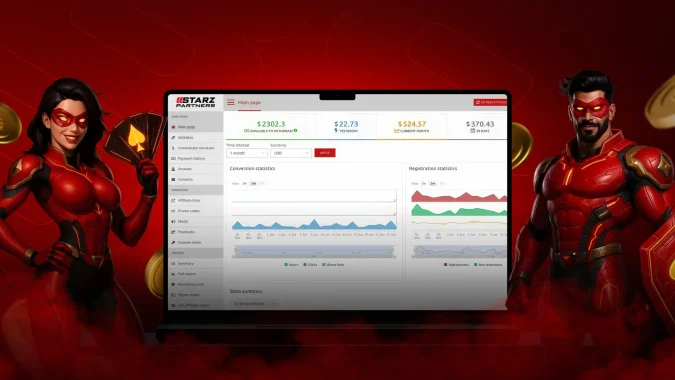What Is Cookie Duration in Affiliate Marketing

- How Cookie Duration Works
- Why Cookie Duration Is Important
- Factors Affecting Cookie Duration
- What Is the Ideal Cookie Duration
- Short vs. Long Cookie Durations: Pros and Cons
- Short Duration (24 hours – 7 days)
- Long Duration (30 – 90 days)
- Lifetime Cookies
- Flexible Cookie Duration (Cookie Duration Tiers)
- Conclusion
- FAQ
Cookie duration is the time window during which an affiliate can earn a commission after a user clicks on their affiliate link. It’s not just a technical parameter, but a fundamental element of any advertising campaign that directly affects the payout for promoting offers. In this article, the 888STARZ team explains what cookie duration is, how it impacts traffic acquisition, and what factors influence this metric.
How Cookie Duration Works
When a user clicks on an affiliate link (whether it’s a banner, text, or a social media post), a small file — a cookie — is stored in their browser. This file contains the affiliate’s unique identifier. From that moment, a countdown begins, with the length set by the affiliate program. If the user completes a target action (such as placing a bet or making a deposit) within this period — regardless of how they return to your site (direct visit, social media ad, search) — the commission will be credited to the affiliate whose cookie is active. If the cookie expires, the affiliate does not receive a payout.
Why Cookie Duration Is Important
First and foremost, cookie duration is essential to fairly compensate affiliates. An affiliate who brings in an interested user should still receive a commission even if the purchase happens a week or a month later. This motivates engaged partners to continue working with the program, especially in niches with long sales cycles like online casinos or betting.
Without an optimal cookie duration, you risk wasting your ad budget without even getting minimal returns. Additionally, a longer cookie duration allows for more accurate attribution, showing the true effectiveness of traffic sources in complex sales funnels.
Factors Affecting Cookie Duration

It’s important to remember that the duration set by the affiliate program is the maximum tracking period. In reality, it may be shorter due to external factors. Browser policies are becoming increasingly strict: Safari, Firefox, and Google are actively restricting third-party cookies, and users can manually delete them in their browser settings.
Changing devices (clicking on a phone but purchasing on a laptop without syncing) resets the cookie tracking. Private mode (Incognito/Private Browsing) usually blocks or deletes all cookies after a session. Ad blockers and anti-tracking extensions can also prevent cookies from being stored. Finally, privacy regulations like GDPR/CCPA: user preferences set through cookie banners may completely block cookie placement in the browser.
What Is the Ideal Cookie Duration
There’s no universal answer. The optimal duration depends on the specifics of your affiliate program and offers. However, in the iGaming space, there are several standard cookie durations:
- 45–60 days: A good balance for most online casinos and sportsbooks. Covers the typical decision-making cycle of a player, including bonus comparisons and reliability checks.
- 60–90 days: Ideal for programs focused on acquiring loyal players, high stakes, complex products (poker rooms, live casinos), or regions with longer decision cycles (e.g., due to Tier-1 verification requirements).
- Extremely short durations (7–14 days) in iGaming are considered non-competitive and usually don’t generate income for affiliates.
Important: The 888STARZ Partners affiliate program sets an optimal cookie duration of 45 days, ensuring our affiliates can reliably earn commissions for their efforts. For top-performing affiliates, we’re ready to offer flexible cookie durations to further boost commission flows for our best webmasters.
Short vs. Long Cookie Durations: Pros and Cons

Cookie duration can be either short or long. Let’s look at the pros and cons of each setting.
Short Duration (24 hours – 7 days)
Short cookie durations may benefit the affiliate program but not the affiliates themselves. Players rarely register or make a deposit within such tight timeframes — reading reviews, comparing odds, or going through verification all lengthen the decision cycle. As a result, the risk of losing a commission due to natural buyer delays becomes very high with short cookie durations.
Long Duration (30 – 90 days)
This approach is the standard in most affiliate marketing niches. This amount of time is usually sufficient for acquired players to review all terms and decide to complete a target action, ensuring the affiliate gets credited. A longer cookie duration is especially valuable when promoting high-value offers, as such products require even more time for players to make informed decisions.
Lifetime Cookies
The term “lifetime cookie” can be misleading, as technically a cookie can’t last forever. Usually, it refers to a very long period (1–2 years) or until the user manually deletes it. The main benefit of such a setting is that it guarantees commission for affiliates. However, lifetime cookies are rarely used because they’re often not cost-effective.
A purchase may be credited to an affiliate whose link was clicked a year ago, even if the final decision was influenced by another partner’s recent efforts or internal media buying. Also, lifetime cookies typically only apply to the first purchase by a referred user, not to all future actions. This creates certain risks for both the affiliate program and the webmasters working within it.
Flexible Cookie Duration (Cookie Duration Tiers)
In reality, working with a fixed cookie duration is not the most advanced approach. Some affiliate programs have already moved to flexible cookie durations, which are set individually for each partner. Here’s what flexible cookie duration depends on:
- Type of partner: Bloggers/review sites – 90 days; cashback sites – 30 days.
- Product/service category: For complex B2B solutions – 90 days; for simple B2C products – 30 days.
- Affiliate performance: Extended durations as a bonus for high conversion rates or quality traffic.
Conclusion
Cookie duration is one of the key factors in successfully promoting offers and generating high earnings. Look for affiliate programs with optimal cookie durations based on the platform and offer type. And if you’re looking to drive traffic to a program with one of the best cookie durations, register with the 888STARZ Partners affiliate program. Our platform offers a cookie duration of up to 45 days — an optimal window to earn commission for your efforts. Additionally, the terms of our offers are considered among the best on the market, meaning most players deposit quickly — so you rarely have to wait for payouts. For top-performing affiliates, we offer custom terms with extended cookie durations and higher rates.
FAQ
How do cookie days affect affiliate earnings?
The longer the duration (e.g., 45 days), the higher the chance of receiving a commission — users often register weeks after clicking. Short durations (7 days) can lead to lost earnings.
What is the optimal affiliate marketing cookie duration for e-commerce?
In the iGaming niche, 45–90 days is ideal. 45 days is the minimum for casinos, while 60–90 days works best for betting and VIP players.
What is the difference between session and persistent cookies?
Session cookies are deleted after the browser is closed and are useless for affiliate tracking. Persistent cookies are stored for a set duration (e.g., 30/90 days) and are used for attribution.
How do marketing cookies interact with GDPR?
Without the user’s consent (via a cookie banner), affiliate cookies are not placed — meaning no commission will be recorded for that user. In the EU, this is a major risk to earnings.



















